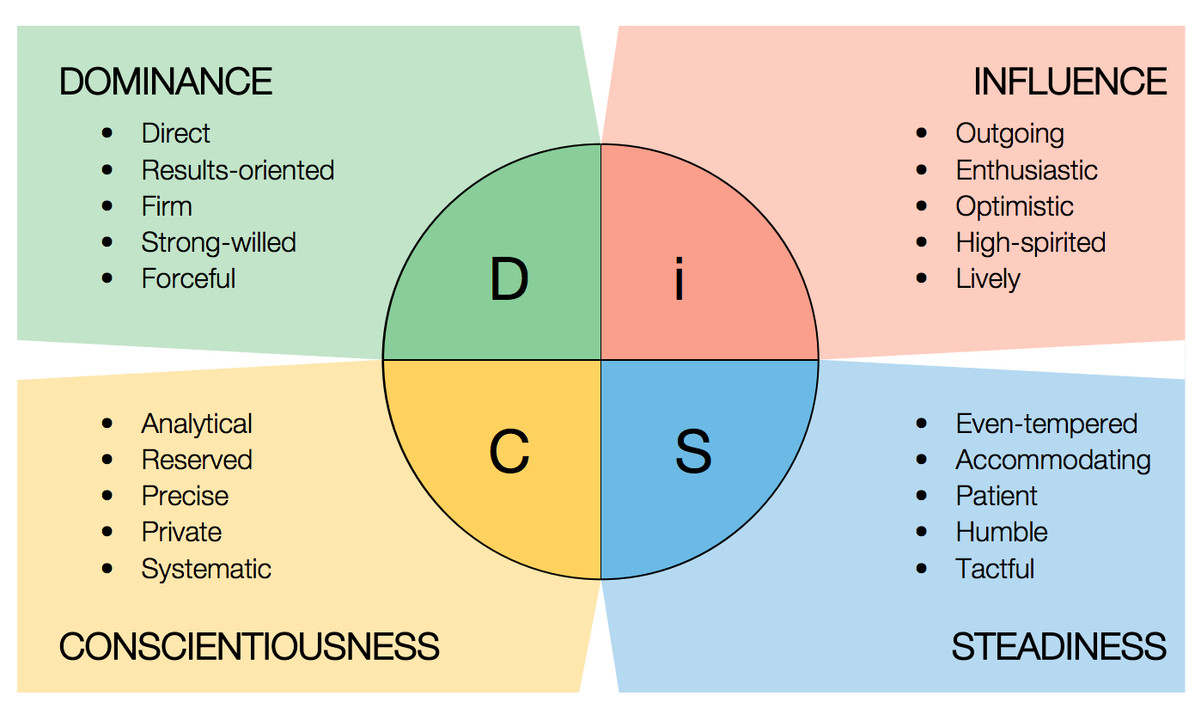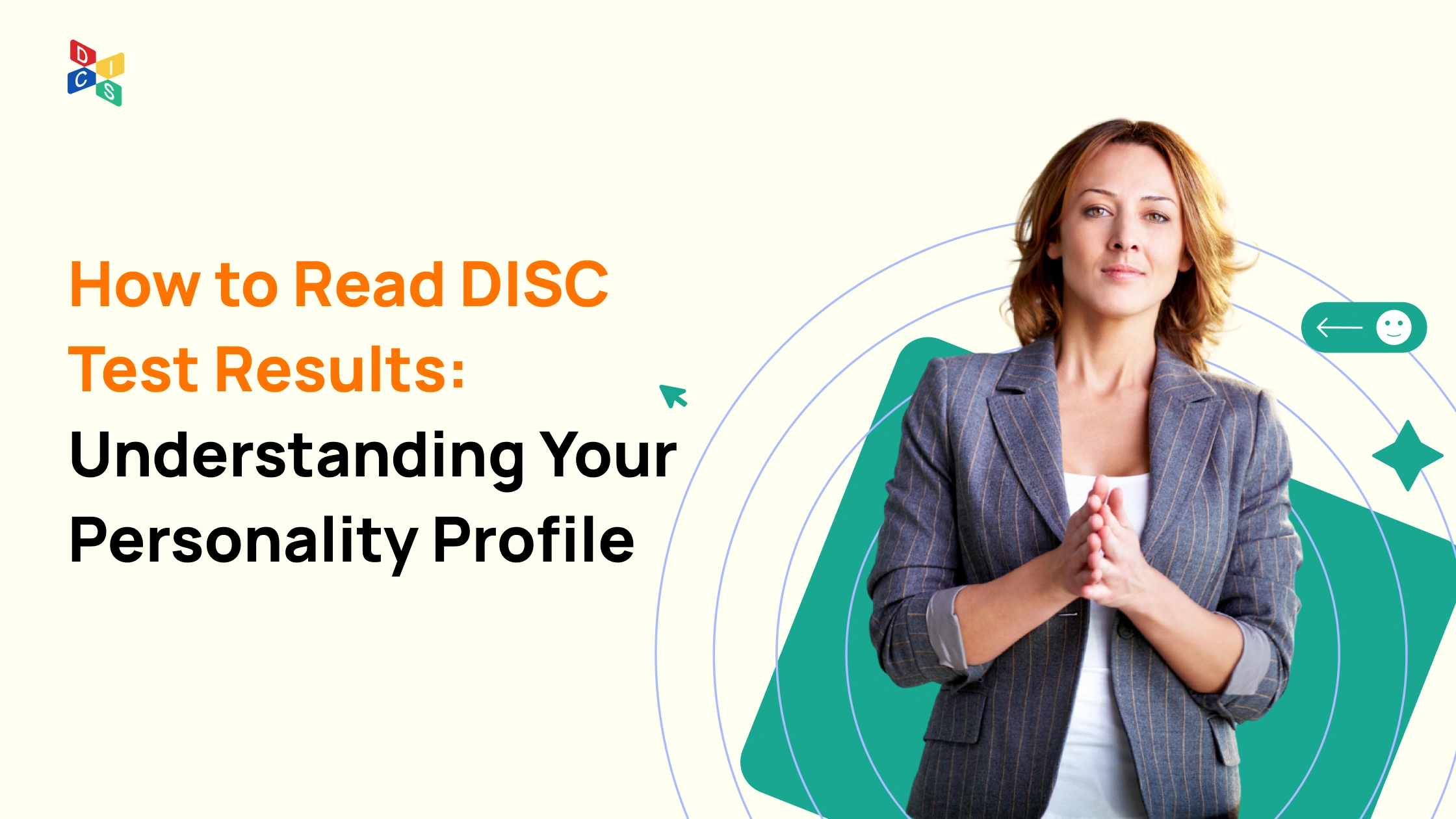Table of content
16 DISC Personality Types: Identify Your Type & Boost Personal Growth
Discover the 16 DISC Personality Types and find out how to identify your profile. Learn how understanding DISC can improve communication, teamwork, and personal growth.
Table of content
Discover the 16 DISC Personality Types and how they can enhance your self-awareness, teamwork, and communication. Based on the 4 core DISC styles—Dominance, Influence, Steadiness, and Conscientiousness—this guide breaks down each personality type, explaining their strengths, challenges, and how to apply this knowledge for personal growth and professional success.

What Are the 16 DiSC Personality Types?
The 16 DISC Personality Types are based on the DISC personality assessment, a tool used to categorize people into distinct behavioral styles. These styles are derived from the 4 primary DISC types: Dominance (D), Influence (I), Steadiness (S), and Conscientiousness (C). By combining these four traits in various ways, we can identify 16 unique personality types that give us a more nuanced understanding of how individuals behave, interact, and respond to challenges.
Why Understanding the 16 DISC Types Matters?
Understanding the 16 DiSC personality types can help individuals and organizations communicate more effectively, collaborate more efficiently, and lead more successfully.

1. Better Self-Awareness and Growth
Knowing where you fall on the 16 DiSC personality types will help you discover your communication preferences, blind spots, and natural strengths. This understanding is important for personal development, emotional intelligence, and making difficult decisions.
This insight is invaluable for personal development and emotional intelligence, as it enables you to:
- Identify blind spots and areas for improvement.
- Embrace your strengths while working on areas that need growth.
- Make better decisions based on a clear understanding of your natural tendencies and reactions.
2. Enhanced Communication and Team Dynamics
Different personality types take quite different approaches to issues, people, and procedures. Understanding the 16 DiSC personality types helps teams better forecast potential conflicts, alter communication approaches, and develop more harmonic, fruitful working relationships.
3. Stronger Leadership and Management
Identifying and working with all 16 types can significantly improve the effectiveness of managers, coaches, and team leaders. You'll be able to reduce misunderstandings, assign tasks that match each team member's strengths, and inspire them all.
4. Deeper Empathy and Human Connection
Understanding the 16 DiSC personality types encourages empathy in both professional and interpersonal situations. It allows people to connect on a deeper psychological level and move beyond surface behaviors, increasing the respect and value of interactions.
Find Your DISC Profile With Us
What Are The 4 Core DISC Styles?
The 4 Core DiSC Styles—Dominance (D), Influence (I), Steadiness (S), and Conscientiousness (C)—form the foundation of the 16 DiSC Personality Types. Here’s a breakdown of each core style and how they impact communication, teamwork, and leadership:

1. D for Dominance: Driven and Decisive
The Dominance style is a key component of several of the 16 DiSC personality types. Boldness, directness, and a focus on results define this type. They enjoy problem-solving, thrive in competition, and are not afraid to take on leadership roles. Dominance types are commonly regarded as leaders that value challenge and efficiency. Despite their outward hostility or assertiveness, they possess an unequaled desire for success.
- Key traits: Assertive, ambitious, competitive, goal-driven
- Motivated by: Achievement, control, winning
- Challenges: Having difficulty being patient or being overly forthright
2. I for Influence: Enthusiastic and Persuasive
Of the 16 DiSC personality types, the I personality type is the most people-oriented and enjoys socializing. They are persuasive, energetic, and great at building relationships. They are natural motivators and communicators due to their captivating enthusiasm. To maintain unity, they may occasionally neglect specifics or avoid controversy.
- Key traits: Outgoing, energetic, persuasive, sociable
- Motivated by: Recognition, approval, collaboration
- Challenges: May have difficulty concentrating or following through
3. S for Steadiness: Supportive and Collaborative
Stability and harmony are important to the 16 DiSC personality types. They are composed, trustworthy, and committed to working as a team. Steadiness types make good team players and excellent listeners. Despite their tendency to avoid conflict, their strength is in their ability to bring people together and build unity.
- Key traits: Patient, loyal, cooperative, dependable
- Motivated by: Security, support, appreciation
- Challenges: May resist change or avoid confrontation
4. C for Conscientiousness: Analytical and Precise
Conscientiousness style is one of the 16 DiSC personality types that do well in tasks that need precision and thorough reasoning. They prefer to work independently and have high expectations of themselves and others. Instead of relying on impulses, they make decisions based on facts and analysis. They thrive in planning and accuracy, but they may sometimes be overly critical or perfectionistic.
- Key traits: Analytical, organized, cautious, detail-oriented
- Motivated by: Accuracy, structure, high standards
- Challenges: May struggle with flexibility or overthinking
| Explore More Now: What Is Disc? All Disc Personality Types Explained |
Exploring the 16 DISC Personality Types in Detail

We now delve into the more complicated world of the 16 DISC personality types, expanding on the four primary DISC styles. These types are defined by the unique combination and priority of the fundamental traits of dominance (D), influence (i), stability (S), and conscientiousness (C). Although a person often has a dominant style, the influence of other types results in a diversity of behavioral tendencies.
1. Dominance-Focused DiSC Personality Types
These types - D, Di, DC, and DS - tend to focus on goals, challenge obstacles directly, and prefer clear, outcome-based communication.

D - Pure Dominance: The Trailblazing Drivers
People with a high D profile, one of the 16 DiSC personality types, exhibit a strong desire for power, control, and swift execution. These individuals are typically aggressive, competitive, and results-oriented, with an emphasis on successfully achieving goals. They are skilled at making independent decisions and perform well under pressure, frequently advocating for changes to existing institutions.
Although their confidence and directness are critical in moving initiatives forward, they can occasionally appear impatient or indifferent to the ideas of others.
- Strengths: Strategic leadership, decisiveness, resilience under pressure
- Challenges: May be perceived as overly aggressive, impatient, or dismissive of collaborative input
- Ideal Roles for D profiles: Executive leadership, crisis management, operations strategy, high-stakes negotiation
DI - Dominance + Influence: The Visionary Catalysts
The DI personality type is a distinct blend of the 16 DiSC personality types, combining the assertiveness of Dominance with the enthusiasm and social agility of Influence. These people are energetic, fast-paced, and persuasive, and they excel in circumstances that need quick thinking and great visibility. Their natural charisma and confidence enable them to sell ideas, lead teams, and launch ambitious projects.
However, this combination may result in impulsiveness, with a tendency to favor vision over execution or miss key details in the pursuit of momentum.
- Strengths: High energy, persuasive communication, entrepreneurial mindset
- Challenges: Prone to overcommitting, may underestimate the need for follow-through
- Ideal Roles: Startup founder, brand strategist, keynote speaker, sales executive
DS - Dominance + Steadiness: The Determined Stabilizers
Among the 16 DiSC personality types, the DS represents a more measured and composed display of Dominance. These individuals bring stability and loyalty to their teams, possess a strong sense of responsibility, and have a strong desire to succeed. They typically favor structure and long-term consequences over short-term advantages, and they make careful decisions.
This personality type typically excels in roles requiring consistency and assertiveness. However, in really volatile settings, their aversion to quick change or emotionally charged conditions may pose difficulties.
- Strengths: Focused leadership, persistence, reliability
- Challenges: May struggle with adaptability or emotional expression
- Ideal Roles: Team lead, operations supervisor, project manager, compliance officer
DC - Dominance + Conscientiousness: The Strategic Executors
The DC profile, one of the more analytical of the 16 DiSC personality types, combines Conscientiousness' accuracy and organization with task-oriented Dominance. These individuals are methodical thinkers who approach problems with logic, self-control, and discipline. They are very acheived, yet they place equal weight on standards and correctness as pure D types.
Although they excel at performing complex tasks and providing strategic leadership, their critical approach can make teamwork difficult if they become overly severe or precise.
- Strengths: Strategic planning, attention to detail, high accountability
- Challenges: Tendency toward inflexibility, risk of overanalyzing
- Ideal Roles: Analyst, legal advisor, operations director, technical lead
2. Influence-Focused DiSC Personality Types
The Influencer’s natural optimism and communication skills make them powerful motivators and connectors in both personal and professional environments.

I - Pure Influence: The Charismatic Communicators
Among the 16 DiSC personality types, the I type stands out for its natural ability to interact, inspire, and connect with others. These folks are often used as team-building stimulants because they are cheery, vocal, and socially confident. They are motivated by emotional connection, recognition, and social interaction.
Although their propensity to develop relationships makes them valuable in client interaction or morale-boosting occupations, their aversion to structure or detail may lead to inconsistencies in implementation.
- Strengths: Relationship-building, verbal persuasion, team motivation
- Challenges: Disorganization, difficulty with follow-through, aversion to routine
- Ideal Roles for I profile: Public relations specialist, community manager, recruiter, brand ambassador
ID - Influence + Dominance: The Energetic Achievers
The 16 DiSC personality types’ ID profile is action-oriented and persuasive, combining aggression and social confidence. These people approach problem-solving with zeal, and they often thrive in fast-paced, competitive environments. Because of their natural enthusiasm and strong drive for success, they make excellent leaders and decision-makers.
However, their quick pace may be at the expense of the patience and attention to detail required for long-term planning.
- Strengths: Confidence, persuasion, goal orientation
- Challenges: Impulsiveness, resistance to feedback, low tolerance for routine
- Ideal Roles: Sales leader, marketing director, startup executive, pitch consultant
IS - Influence + Steadiness: The Empathetic Collaborators
The IS profile is one of the 16 DiSC personality profiles that is most relational. These individuals are exceptionally pleasant and dependable team members due to their consistent demeanor, friendliness, and empathy. They thrive in nurturing, collaborative environments and are naturally sensitive to the emotional needs of others.
Their biggest issue is that they are unwilling to speak up or cope with conflict, typically favoring harmony over other factors, even when it may be detrimental to the broader picture.
- Strengths: Loyalty, emotional intelligence, teamwork
- Challenges: Avoidance of confrontation, indecision under pressure
- Ideal Roles: Teacher, counselor, support lead, client success manager
IC - Influence + Conscientiousness: The Persuasive Strategists
The Ic personality type is one of the most balanced of the 16 DiSC personality types, combining sociability and ingenuity with a concern for quality and regulations. These folks value rational, expressive, and perceptive innovation. They excel in roles needing data, structure, or regulatory frameworks to enable persuasive discourse.
However, this profile may face internal conflict between their desire for connection and their tendency toward perfectionism or self-criticism.
- Strengths: Structured creativity, clear communication, quality control
- Challenges: Hesitation, self-doubt, internal conflict between spontaneity and order
- Ideal Roles: Content strategist, compliance trainer, brand analyst, UX researcher
3. Steadiness-Focused DiSC Personality Types
The S personality values harmony, consistency, and strong relationships, often serving as the steady force that keeps teams grounded and collaborative.

S - Pure Steadiness: The Loyal Supporters
Among the 16 DiSC personality types, the S type represents dependability, patience, and serenity. These individuals are considerate, cooperative, and deeply committed to their relationships and teams.
Despite not looking for attention, steadiness types are essential in every context owing to their reliability and consistency. They thrive in supportive roles and are excellent listeners, team players, and compassionate participants.
- Strengths: Patience, loyalty, consistency
- Challenges: Difficulty with change, avoidance of conflict
- Ideal Roles for S profiles: HR professional, teacher, caregiver, project coordinator
SI - Steadiness + Influence: The Compassionate Connectors
The SI blend of the 16 DiSC personality types includes emotional intelligence, interpersonal skills, and warmth. SI persons are outgoing but also reliable and trustworthy, making them excellent communicators who genuinely care about the well-being of others.
They quickly build true connections, promote trust, and frequently act as the "glue" that holds communities and teams together. They excel in people-first roles due to their laid-back demeanor and sense of obligation.
- Strengths: Empathy, communication, relationship-building
- Challenges: May avoid confrontation or hesitate under pressure
- Ideal Roles: Customer support lead, team coach, community manager, healthcare liaison
Find Out: The Counselor Types in DISC
SC - Steadiness + Conscientiousness: The Reliable Analysts
Among the 16 DiSC personality types, the SC type is one of the more restrained; it combines a need for correctness with a calm demeanor. These people are considerate, trustworthy, and determined to do things well. They operate systematically and often prefer routines, structure, and clear expectations.
SC types are commonly trusted in circumstances that require precision and consistency. They are generally excellent at maintaining systems and boosting efficiency, and they are unlikely to make rash decisions.
- Strengths: Thoroughness, reliability, planning
- Challenges: May struggle with adaptability or assertiveness
- Ideal Roles: Administrative manager, quality assurance specialist, process analyst
SD - Steadiness + Dominance: The Steady Drivers
The SD profile is a unique combination of quiet leadership and calm persistence among the 16 DiSC personality types. These people are grounded but resolute; they take their time making decisions, but once they do, they carry them out with direction and purpose.
Although goal-oriented, SD types prefer stability. Because of this balance, they excel as long-term planners and leaders, earning respect by being trustworthy rather than charismatic.
- Strengths: Patience, dependability, goal focus
- Challenges: Can be slow to adapt or reluctant to speak up
- Ideal Roles: Project manager, operations planner, department supervisor
4. Conscientiousness-Focused DiSC Personality Types
The C thrive in structured environments, value accuracy, and are driven by logic and high standards. Often reserved and methodical, they contribute through careful planning and quality-focused execution.

C - Pure Conscientiousness: The Detail Experts
Of the 16 DISC personality types, the C profile is the most analytical and meticulous. These people are systematic, meticulous thinkers with high standards for themselves and others. They are motivated by precision, organization, and sensible outcomes.
C types prefer circumstances in which they can act autonomously or with well-defined roles. Although they may appear reluctant, their attention to detail makes them helpful in tasks that require precise execution.
- Strengths: Accuracy, critical thinking, organization
- Challenges: Perfectionism, reluctance to delegate, risk aversion
- Ideal Roles for C profiles: Data analyst, accountant, editor, compliance officer
CS - Conscientiousness + Steadiness: The Process Guardians
The CS mix is one of sixteen DiSC personality types that takes a consistent, rules-first approach. Tradition, rigorous planning, and consistency are appreciated by CS individuals. They are dependable personnel that thrive in structured environments and are typically regarded as the "guardians" of policies and guidelines.
Although they may not seek leadership positions, their dependability and extensive understanding of their subject offer them influence. They ensure that protocols are followed and that quality is upheld at all times.
- Strengths: Discipline, consistency, loyalty
- Challenges: Can be resistant to change or overly cautious
- Ideal Roles: Compliance manager, technical writer, operations auditor
CI - Conscientiousness + Influence: The Thoughtful Creators
Among the 16 DiSC personality types, the CI type blends analytical thinking with a dash of creativity and charm. These folks like exchanging opinions, but they also value accuracy and reason. They are generally more expressive than other C types, making them valuable in professions that require both communication and intelligence.
CI personalities usually approach difficulties with a logical strategy and a cooperative attitude. They value accuracy, but they also want their work to be emotionally impactful.
- Strengths: Strategic thinking, attention to detail, effective communication
- Challenges: May second-guess decisions or struggle with rapid shifts
- Ideal Roles: UX designer, consultant, content strategist, instructional designer
CD - Conscientiousness + Dominance: The Strategic Executors
The CD mix is one of the more aggressive DiSC personality types, combining a bright, analytical intellect with a strong desire for results. These folks are strategic, focused, and serious; they want things done well and efficiently.
CD types often have high standards, are self-sufficient, and are skeptical of ambiguous concepts. They excel at problem-solving in situations where both accuracy and performance are critical.
- Strengths: Strategic execution, problem-solving, high standards
- Challenges: Can be rigid, overly critical, or reluctant to compromise
- Ideal Roles: Financial analyst, engineer, legal strategist, systems architect
Find Out In Details: DISC vs MBTI: What Are The Differences Between Them? 2025 Guide
Find Your DISC Profile With Us
How to Identify Your DISC Type?

Taking the reliable 16 DISC personality types test is the best way to determine your type. In just a few minutes, you can receive a detailed analysis of your dominant and secondary characteristics among these types. After taking the exam, you will have a better understanding of how your personality influences your leadership, teamwork, and communication skills.
| Take the 16 DISC personality types test free: DISC PERSONALITY TEST |
Applying the 16 DISC Personality Types in Career Path

Each of the 16 DISC personality types careers has a unique mix of motivations, work preferences, and strengths. If you match your natural style with an appropriate professional path, you're more likely to be satisfied, do your best work, and acquire confidence.
- D types: Excel in high-impact roles that reward initiative and decisiveness, such as executive leadership, strategic planning, and entrepreneurship.
- I types: Thrive in social and creative jobs that need excitement, expression, and interpersonal skills, such as sales, marketing, public speaking, and brand advocacy.
- S types: Ideal for supportive roles such as human resources, education, counseling, or healthcare because they are trustworthy, compassionate, and composed under pressure.
- C types: Excel in analytical, detail-oriented fields requiring precision and in-depth thinking, such as data science, engineering, accounting, and law.
If you're still unsure where you fit, consider exploring the Comprehensive DiSC Test Deck to gain deeper insights into your behavioral profile and career alignment.
How to Identify Your DiSC Personality Type?
The most reliable and efficient way to identify your DISC Personality Type is by taking a DISC Personality Test. This scientifically validated test will assess your behavior in different situations, providing a detailed analysis of your dominant traits and secondary tendencies.
Take the DiSC Personality Test today and unlock insights that can transform your communication skills, improve teamwork, and boost your leadership potential.
Final Thoughts
Beyond simply labeling, the 16 DiSC personality types provide a lens through which we can see ourselves and others more clearly. Every personality combination has distinct opportunities, challenges, and strengths. Accepting these distinctions and using that insight in practical situations, such as choosing the best career path, enhancing relationships, or creating leadership, unlocks the full potential of both individuals and teams.
If you're interested in seeing how these dynamics appear in character storytelling, you’ll love Discover the DISC personality traits of the Symbiote family - a illustrative spin on the 16 DiSC personality types.
FAQs
What exactly are the DISC personality types?
The DiSC personality model separates individuals into four major styles: dominance (D), influence (I), steadiness (S), and conscientiousness (C). Each style demonstrates how people solve problems, communicate with others, pace their work, and follow processes or norms. These insights help people get a better awareness of themselves, as well as improve their teamwork and communication skills.
How are the 16 DISC personality types different from the original 4 DISC styles?
By studying blended styles (e.g., DI, SC, ID, etc.), the 16 DiSC personality types offer a more comprehensive and nuanced perspective than the original DiSC framework, which only defined four basic styles. It generates 16 more customized profiles by taking into account both a person's dominant trait and their secondary tendencies.
How accurate are DISC assessments?
Because of its dependability, DiSC exams are frequently used and recognized in professional and personal development settings. Despite the fact that no personality test is completely conclusive, DiSC gives helpful, behavior-based insights that are straightforward to implement and consistently validated across a variety of industries.
Can understanding DISC help with career choices?
Of course. One of the most valuable applications of the 16 DiSC personality types is identifying work environments and career paths that align with your natural preferences. When you understand your type, you may make more educated and compatible work decisions.
Is DISC the same as Myers-Briggs (MBTI)?
Not exactly. Despite coming from different psychological frameworks, both tools aim to improve interpersonal understanding and self-awareness. DiSC emphasizes observable behavior and communication style, whereas MBTI focuses on cognitive preferences (such as introversion versus extraversion). DiSC's simplicity and emphasis on everyday interactions make it more applicable in professional settings.


Don't Let Your Potential Stay Hidden!
Take the DISC test today and discover your unique 'YOU', with deep insights into your true personality and potential.

Represents your instinctive behaviors and desires.
Shows the behavioral tendencies you think you should exhibit in specific situations.
Related articles
You may also be interested in
 DISCJan 06, 2026
DISCJan 06, 2026DISC Personality Test for Sales: Unlock Your Team’s Full Potential
DISC Personality Test for Sales helps sales teams improve role fit and performance. Learn how DISC boosts hiring, coaching, and customer alignment.
 DISCJan 06, 2026
DISCJan 06, 2026How to Read DISC Test Results: Understanding Your Personality Profile
Learn how to read DISC test results and understand your personality profile. Discover how DISC can enhance communication, teamwork, and career growth.
 DISCDec 31, 2025
DISCDec 31, 2025What Is Group Culture? How Team Behaviors Shape Workplace Success
Discover what is group culture and how it shapes team dynamics, decision-making, and performance. Learn how the DISC model can help improve your team’s culture.
